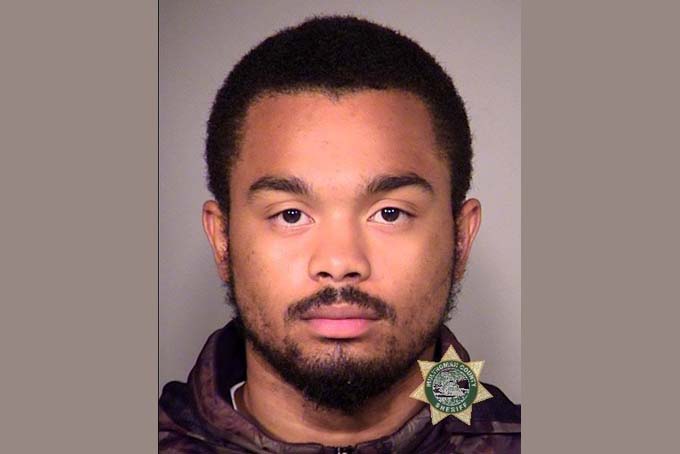
PORTLAND, Ore. (AP) — Portland police officers who encountered a loaded gun in a backpack next to a Northeast Portland 7-Eleven faced a quandary: Just who did the gun belong to?
Police officers found no identification in the backpack, but they did find a hair pick.
So police turned to four men in a minivan parked 10 to 15 feet away. Three were Hispanic and one was Black. Though the Black man’s hair was closely cropped, his hair was still longer and thicker than the Hispanic men, who sported crew cuts. So police arrested the Black man, determining the hair pick — and the gun — most likely belonged to him.
But a Multnomah County Circuit judge has ruled the Sept. 4 arrest was unlawful, finding police lacked probable cause to arrest 18-year-old Maleek Owens.
That was even though police had offered another piece of evidence to link Owens to the gun: An officer who, shortly before the arrest, had been about 50 yards away when he’d seen an unidentified Black man leave the minivan’s passenger side, the side closest to the backpack. When police approached the minivan, Owens was sitting in the same spot the unidentified Black man had been sitting in.
Based on the judge’s ruling last week, prosecutors this week agreed to drop case. Owens had been charged with two misdemeanors aimed at curbing gun violence: possession of a loaded firearm in the city of Portland and unlawful possession of a firearm for carrying a concealed weapon without a permit.
Amanda Alvarez, the public defender who represented Owens, said the case raised eyebrows in her office.
“The general consensus was that trying to connect a hair pick to a particular person was pretty surprising to us,” Alvarez said.
During a motions hearing to suppress evidence collected after the arrest, Alvarez questioned police about the role race played in Owens’ arrest. Officer John Andonian agreed that someone of another race could own a hair pick.
Officer Christopher Burley, who is White, also testified he used to use a hair pick before he went bald.
The defense attorney also questioned whether the gun could have belonged to another Black man — who had hair similar to Owens’ — especially when police said they saw him fleeing the area just before officers drove up in their cruisers.
What’s more, Alvarez questioned police about the possibility that the hair pick and gun could have belonged to other people in the surrounding neighborhood. When it came time to argue her case to the judge, Alvarez pointed out that police didn’t know how long the backpack had been there.
“The bottom line is officers had no idea when that bag was placed there,” Alvarez said.
Deputy District Attorney Richard Freud said officers arrested Owens not because he was Black but because he was the only one who appeared he might use a hair pick because of the texture of his hair.
“It’s not racism by the officer, it’s them looking at the facts,” Freud said.
Multnomah County Circuit Judge Eric Bloch sided with the defense — agreeing that the gun could have belonged to someone else.
“There could have been any number of African-Americans in and around the area prior to the time the police arrived at the scene,” Bloch said.
Bloch also said the gun’s owner could have very well been the Black man who fled the scene near Northeast Martin Luther King Jr. Boulevard and Sumner Street, especially when police believed he was a gang member known to carry weapons.
Bloch’s ruling meant that if the case went to trial, prosecutors could not use a statement police say Owens made after his arrest: that indeed the gun was his.
Glen Banfield, the prosecutor who oversees the misdemeanor trial unit, said his office carefully weighed whether to pursue charges against Owens.
Banfield concluded that race was indeed a factor in the arrest — that an African American man is more likely to use a hair pick than three Hispanic men with crewcuts.
But also, Banfield said, the arresting officers thought Owens was the gun’s owner because he was sitting in the passenger seat, where the unidentified Black man had been seen leaving.
“And he was right,” Banfield said, noting Owens admitted the gun was his.
Alvarez, the defense attorney, said that’s beside the point.
“The police shouldn’t be able to arrest people based on stereotypes,” Alvarez said. “I understand gang violence is a problem. But the ends don’t justify the means.”
___
Information from: The Oregonian, https://www.oregonlive.com